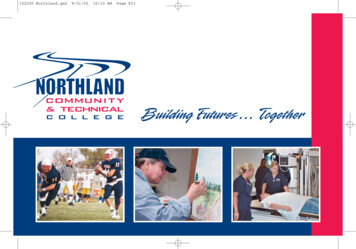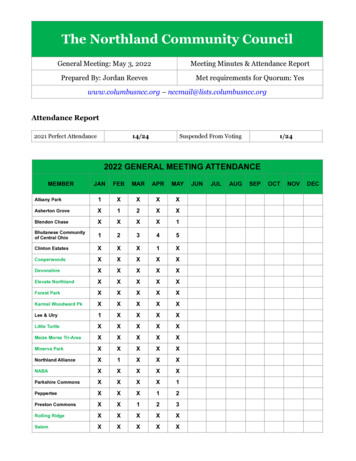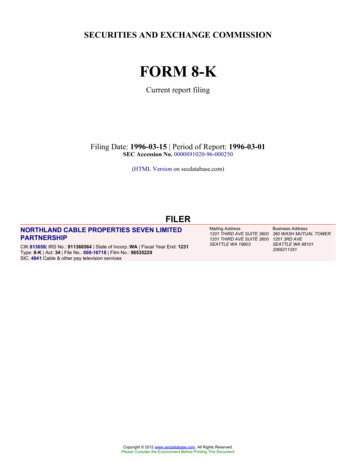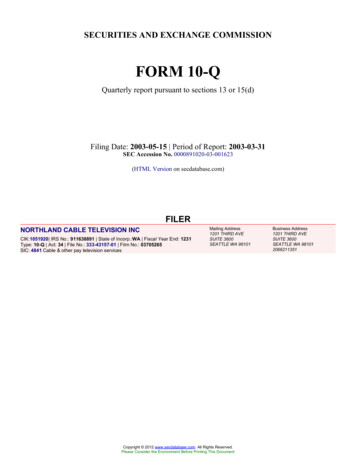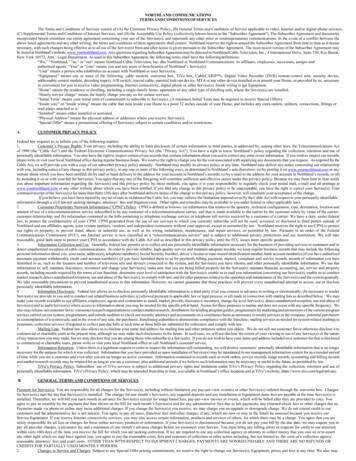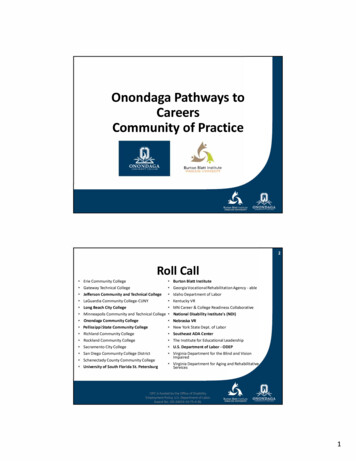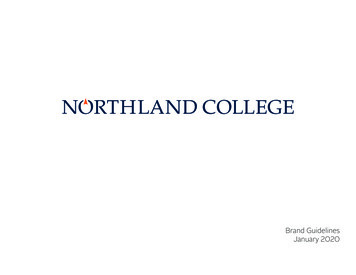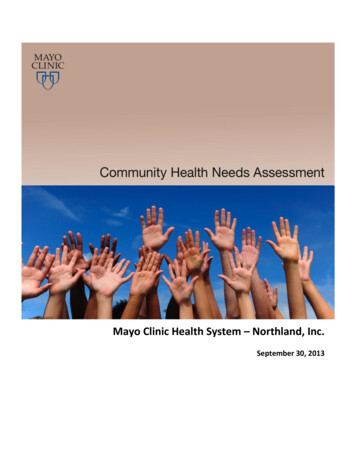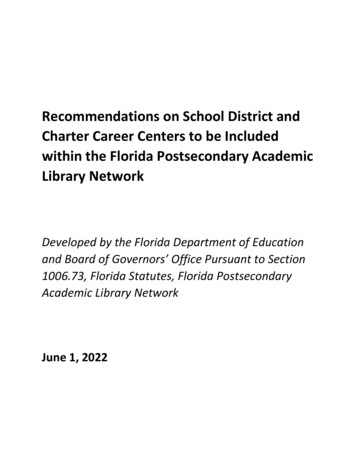
Transcription
Volume1NORTHLAND COMMUNITY AND TECHNICALCOLLEGEPHARMACY TECHNOLOGY PROGRAMProgramHandbook
PHARMACY TECHNOLOGYProgram HandbookContact informationDanika Braaten, CphT, RphtNorthland Community and Technical College2022 Central Ave NEEast Grand Forks, MN 56721Phone 218.793.2568www.northlandcollege.eduEmail: Danika.Braaten@northlandcollege.edu
Table of ContentsIntroductionProfessional DescriptionProgram AccreditationASHP Accreditation StandardsLearner OutcomesCurriculum DesignDiploma CurriculumAAS CurriculumElective CreditsCourse DescriptionsProgram Application ProcessProgram PoliciesLaptop ComputersHealth InsuranceClinical Facility RequirementsConfidentialityBlood Borne PathogensDress CodeStudent Pregnancy PolicySafe CareGeneral Course PoliciesAbsence and IllnessInterruption of ProgramStudent Statement of UnderstandingClinical Information11
WelcomeYou have chosen to pursue a career in pharmacy as a PharmacyTechnician. The role of a Pharmacy Technician is exciting, challenging,and rewarding. Pharmacy Technicians assist pharmacists in the dailyoperations of pharmacy which do not require the professional judgmentof the pharmacist. The role of a Pharmacy Technician is filled withresponsibility. In fact, the level of responsibility cannot be stressedsufficiently for you to fully realize its scope, and you will be faced with itconstantly as you go about your daily functions.This student handbook has been prepared to help you learn andunderstand some of these responsibilities that apply directly to you as astudent Pharmacy Technician. One very important word that youshould understand now is ETHICS. Ethics is a code of conduct andbehavior. A pattern of proper conduct at all times is essential in personsdesiring a career in any profession. The ethical responsibilitiesassociated with a career in healthcare make it necessary for thosepracticing in this domain to carefully consider all of their actions both onand off duty.It is absolutely essential that all members of the medical teamunderstand that the patient comes first! The regulations embodied inthis handbook were all written with this thought in mind. Each studentshould realize that the contents of the manual are not intended to bediscriminatory to anyone. Furthermore, these policies, regulations, andprocedures are now in effect. Northland Community and TechnicalCollege and this program reserve the right to make changes at any timeto reflect current policies, administrative regulations and procedures,and amendments by state and/or federal law. Students are urged tostudy the contents of this handbook carefully, for they are responsiblefor observing the regulations contained herein. Any questions orcomments concerning material in the student handbook should beaddressed to the Pharmacy Technician Program director.During the first few weeks and months in this training program, you willneed to learn cooperation. Your first and closest associates will be yourcolleagues—those fellow students who occupy the chairs around you.As a member of the class, it is your immediate responsibility to worktogether. You will need to accept the attitudes and ideas of some classmembers that can be very different from your own. Whenever there is
discontentment or disharmony within the class, the goals of the classcannot be reached successfully. A student who can discuss,demonstrate, and debate in the proper manner is an individual who willlearn. In any profession, in order to be successful, a person must beable to listen, ask questions, express opinions, correct mistakes, andmake use of his or her abilities. Try to keep your relationship with yourcolleagues on an equal level. Help each other. Discuss and solve yourproblems together. A competitive atmosphere is desirable becausecompetitiveness propagates success.A copy of the Northland Community and Technical College studenthandbook may be downloaded from the Northland website nt-handbook/. Thepolicies and procedures noted in this handbook are designed to supportthe success of the Pharmacy Technician student. Read this handbookin its entirety as you are expected to follow all of the regulations andguidelines that are contained within.As a Northland Community and Technical College student preparing fora pharmacy career, you are expected to: Attend all scheduled classes and labs. Demonstrate integrity and honesty on and off campus. Use respectful communication. Embrace new and different concepts with a positive attitude. Complete assignments and course requirements in a timelymanner. Represent yourself along with Northland Community andTechnical College in a professional manner on and off campus,during college field trips, meetings and during your internshipexperiences.The faculty and staff at NCTC wish you success in the pursuit ofyour healthcare career. The academic challenges that await you arerigorous, but dedication and determination will assist you in reachingyour career goals.Welcome to the Pharmacy Technician Program!Danika BraatenPharmacy Technician Program Director1
Profession DescriptionThe Pharmacy Technician works as an assistant to a RegisteredPharmacist, assisting or relieving the Pharmacist in routine technical andclerical duties and functioning in strict accordance with standard writtenprocedures and guidelines under the supervision of the professionalPharmacist. Pharmacy Technicians perform such tasks asfilling prescriptions, packaging doses, performing inventorycontrol, and record keeping.Pharmacy Technicians have a variety of employmentopportunities. They are employed by hospitals, communitypharmacies, clinics, homecare, long term care, mail orderprescription pharmacies, drug manufacturing companies,and various other settings. Program graduates findexcellent employment opportunities both locally andnationally. You can find additional information about the Pharmacy Technicianprofession at the American Association of Pharmacy Technicians (AAPT)website www.pharmacytechnician.comProgram AccreditationThe Northland Community and Technical College Pharmacy TechnologyProgram is accredited by the American Society of Health-SystemPharmacists (ASHP). Graduates of the Pharmacy Technology program areeligible to take the national certification exam at the first offering aftergraduation.The Pharmacy Technician Program will undergo continuousreevaluation, which includes written reports at least every three yearsand reexamination by site visit at least every six years. To remain2
accredited, the Program must follow the “ASHP Accreditation Standardfor Pharmacy Technician Training Programs.” The Standard consists ofsix parts: Part 1-Administration, Part 2- Program Faculty, Part 3Education and Training Program, Part 4- Students, Part 5- Evaluationsand Assessments, Part 6- Graduation and Certificate. A copy of theStandard is available from the Program Director. In addition, theStandard will be discussed in more detail during the program.The purpose of gaining accreditation is to demonstrate that the trainingprogram meets or exceeds the requirements of the Standard. As astudent and graduate of a training program, accreditation is importantfor several reasons. First, accreditation ensures that you are receivingtraining and skills that reflect the national standard. Second, employerswill know that the education and training you received meets theStandard’s criteria. Finally, accredited programs must constantly work toremain up-to-date on pharmacy practice trends. Because of thiscontinuous evaluation process, students can be assured that they arelearning the most current information available relating to pharmacy.Furthermore, the pharmacy technician certification board (PTCB) hasdetermined that by 2020 any candidate who wishes to sit for thePharmacy Technician Certification Exam(PTCE) will have had tograduate from an ASHP accredited Pharmacy Technician Program.ASHP may be contacted by the following:ASHP (American Society of Health-System Pharmacists)7272 Wisconsin Ave.Bethesda, Maryland 20814www.ashp.org3
ASHP 45 Goal AreaGoalsPersonal/Interpersonal Knowledge and Skills(1) Demonstrate ethical conduct in all job-related activities.(2) Present an image appropriate for the profession of pharmacy in appearance andbehavior.(3) Communicate clearly when speaking and in writing.(4) Demonstrate a respectful attitude when interacting with diverse patient populations.(5) Apply self-management skills, including time management, stress management, andadapting to change.(6) Apply interpersonal skills, including negotiation skills, conflict resolution, andteamwork.(7) Apply critical thinking skills, creativity, and innovation to solve problems.Foundational Professional Knowledge and Skills(8) Demonstrate understanding of healthcare occupations and the health care deliverysystem.(9) Demonstrate understanding of wellness promotion and disease prevention concepts,such as use of health screenings; health practices and environmental factors thatimpact health; and adverse effects of alcohol, tobacco, and legal and illegal drugs.(10) Demonstrate commitment to excellence in the pharmacy profession and tocontinuing education and training.(11) Demonstrate knowledge and skills in areas of science relevant to the pharmacytechnician’s role, including anatomy/physiology and pharmacology.(12) Perform mathematical calculations essential to the duties of pharmacy techniciansin a variety of contemporary settings.(13) Demonstrate understanding of the pharmacy technician’s role in the medicationuse process.(14) Demonstrate understanding of major trends, issues, goals, and initiatives takingplace in the pharmacy profession.(15) Demonstrate understanding of nontraditional roles of pharmacy technicians.(16) Identify and describe emerging therapies.Processing and Handling of Medications and Medication Orders(17) Assist pharmacists in collecting, organizing, and recording demographic andclinical information for direct patient care and medication-use review.(18) Receive and screen prescriptions/medication orders for completeness, accuracy,and authenticity.(19) Assist pharmacists in the identification of patients who desire/require counseling tooptimize the use of medications, equipment, and devices.(20) Prepare non-patient-specific medications for distribution (e.g., batch, stockmedications).(21) Distribute medications in a manner that follows specified procedures.(22) Practice effective infection control procedures, including preventing transmission ofblood borne and airborne diseases.
(23) Assist pharmacists in preparing, storing, and distributing medication productsrequiring special handling and documentation (e.g., controlled substances,immunizations, chemotherapy, investigational drugs, drugs with mandated RiskEvaluation and Mitigation Strategies [REMS]).(24) Assist pharmacists in the monitoring of medication therapy.(25) Prepare patient-specific medications for distribution.(26) Maintain pharmacy facilities and equipment, including automated dispensingequipment.(27) Use material safety data sheets (MSDS) to identify, handle, and safely dispose ofhazardous materials.Sterile and Nonsterile Compounding(28) Prepare medications requiring compounding of sterile products.(29) Prepare medications requiring compounding of nonsterile products.(30) Prepare medications requiring compounding of chemotherapy/hazardous products.Procurement, Billing, Reimbursement and Inventory Management(31) Initiate, verify, and assist in the adjudication of billing for pharmacy services andgoods, and collect payment for these services.(32) Apply accepted procedures in purchasing pharmaceuticals, devices, and supplies.(33) Apply accepted procedures in inventory control of medications, equipment, anddevices.(34) Explain pharmacy reimbursement plans for covering pharmacy services.35) Apply patient and medication-safety practices in all aspects of the pharmacytechnician’s roles.(36) Verify measurements, preparation, and/or packaging of medications produced byother healthcare professionals (e.g., tech-check-tech).(37) Explain pharmacists’ roles when they are responding to emergency situations andhow pharmacy technicians can assist pharmacists by being certified as Basic LifeSupport (BLS) Healthcare Providers.(38) Demonstrate skills required for effective emergency preparedness.(39) Assist pharmacists in medication reconciliation.(40) Assist pharmacists in medication therapy management.Technology and Informatics(41) Describe the use of current technology in the healthcare environment to ensure thesafety and accuracy of medication dispensing.Regulatory Issues(42) Compare and contrast the roles of pharmacists and pharmacy technicians inensuring pharmacy department compliance with professional standards and relevantlegal, regulatory, formulary, contractual, and safety requirements.(43) Maintain confidentiality of patient information.
Quality Assurance(44) Apply quality assurance practices to pharmaceuticals, durable and nondurablemedical equipment, devices, and supplies.(45) Explain procedures and communication channels to use in the event of a productrecall or shortage, a medication error, or identification of another problem.
NORTHLAND COMMUNITY& TECHNICAL COLLEGEProgram: Pharmacy Technology (Diploma)(36 credits)Program Learner Outcomes1. Students will complete all assigned tasks and duties according topolicies and procedures governing hospital, retail, and industrialpharmacy.2. Students will perform proficiently and professionally as aPharmacy Technician in hospital, retail, and industrial environments.3. Students will prepare and interpret pharmacy orders accuratelyand proficiently.4. Students will exhibit work ethic characteristics of professionalism,responsibility, and dependability.5. Students will apply principles of basic sciences to the practice ofpharmacy technology.6. Students will communicate effectively with patients, physicians, andcolleagues based upon respect, dignity, and worth of each person.NORTHLAND COMMUNITY& TECHNICAL COLLEGEProgram: Pharmacy Technology (AAS)(60 credits)Program Learner Outcomes1. Students will complete all assigned tasks and duties according topolicies and procedures governing hospital, retail, and industrialpharmacy.2. Students will perform proficiently and professionally as aPharmacy Technician in hospital, retail, and industrial environments.3. Students will prepare and interpret pharmacy orders accuratelyand proficiently.4. Students will exhibit work ethic characteristics of professionalism,responsibility, and dependability.5. Students will apply principles of basic sciences to the practice ofpharmacy technology.6. Students will communicate effectively with patients, physicians, andcolleagues based upon respect, dignity, and worth of each person.
Curriculum DesignThe didactive component of the Pharmacy Technology program is taught through lectureand laboratory demonstration and practice.The lecture portion reinforces basicpharmacology, sterile technique, calculations, and law, etc. The laboratory portion ofinstruction is used to demonstrate proper methods of technique and allow the student topractice and demonstrate an expectable level of technical skill and competency. The clinicalinternship is completed at the end of the program after all of the didactive experiences arecompleted.Diploma ProgramPharmacy Technology Diploma36 creditsFall SemesterCourse #Course TitleCreditsLec/Lab/OJTHLTH 1106Medical Terminology22/0/0PHRM 1001Fund Concepts of Pharmacy11/0/0PHRM 1002Pharmacy Calculations22/0/0PHRM 2001Pharmacy Prin/Prac I42/2/0SSCI 1101Human Relations33/0/0MN Transfer Elective3CHEM 1020Introductory Chemistry43/1/0BIOL 1004Intro to Anatomy & Physiology33/0/0PHRM 2002Pharmacy Prin/Prac II52/3/0PHRM 2004Drug Properties/Distribution32/1/0PHRM 2010Experiential/Hospital30/0/3PHRM 2012Experiential/ Retail30/0/3Spring SemesterSummer Semester
AAS Program60 credits1st Fall SemesterCourse#Course TitleCreditsLec/Lab/OJTBIOL 2252Anatomy and Physiology ISPCH 1101Public Speaking33/0/0CPTR 1104Intro to Computer Tech32/1/0HLTH 1106Medical Terminology22/0/0PHRM 1001Fund Concepts of Pharmacy11/0/0PHRM 1002Pharmacy Calculations22/0/032/1/01st Spring SemesterBIOL 2254Anatomy and Pysiology II3ENGL1111Composition I33/0/0MATH 1102Contemporary Math33/0/0orMATH1110College Algebra33/0/0PSYC 1105Intro to Psychology33/0/0BIOL 2221Microbiology32/1/0CHEM 1020Intro to Chemistry43/1/0PHRM 2001Pharmacy Prin/Prac I42/2/0Humanities/Fine Arts Elective3SSCI 1101Human Relations33/0/0PHRM 2002Pharmacy Prin/Prac II52/3/0PHRM 2004Drug Properties/Distribution32/1/0MN Transfer elective32nd Fall Semester2nd Spring SemesterSummer SemesterPHRM 2010Experiential/Hospital30/0/3PHRM 2012Experiential/Retail30/0/32/1/0
Course DescriptionsCPTR 1104Intro to Computer Tech3credits2/1/0This course covers the operation of the personal computer hardware and software. The course is an overview of a personalcomputer operating systems, word processing, spreadsheets, presentation, e-mail, scheduling, internet, and databasemanagement software. Prerequisite: None.HLTH 1106Medical Terminology2 credits2/0/0This course covers prefixes, suffixes, and roots used to compose medical terms. The student learns to spell, pronounce,define, analyze, and formulate terminology related to body structure, disease, diagnosis, and treatment. Medicalabbreviations are also included. Prerequisite: NonePHRM 1001Fund Concepts of Pharmacy1 credits1/0/0This course introduces the student to the organization and function of the hospital and retail pharmacy. Emphasis is placedupon the duties and responsibilities of the pharmacy technician, and the calculations required to accurately prepare patientmedications for distribution. Prerequisite: None.PHRM 1002Pharmacy Calculations2 credits2/0/0This course introduces the student to the calculations required to accurately prepare patient medication fordistribution. Prerequisite: MATH0080 or an Accuplacer score of 50 or higher.PHRM 2001Pharmacy Prin/Prac I4 credits2/2/0This course covers drug names, classifications and mechanisms of action, the use of computers in pharmacy and theirpractical applications. The student will be introduced to hospital and retail dispensing techniques as well as basic customerservice. Prerequisite: None.PHRM 2002Pharmacy Prin/Prac II5 credits2/3/0This course covers intravenous drug admixture, TPN compounding, critical care intravenous admixture, and unit dosemedication dispensing to nursing units. Emphasis is placed upon medication storage and stability, diabetic supplies, andchemotherapy storage and admixture. Prerequisites: PHRM 1001, PHRM 1002, and PHRM 2001.PHRM 2004Pharmacy Law/Practice3 credits2/1/0This course introduces pharmacy law and subjects pertaining to professional practice, including compoundingproducts, resumes and interviewing, and reimbursement for pharmacy services. Prerequisite(s): PHRM1001,PHRM1002, PHRM 1002, & PHRM2001.PHRM 2010Experimental/Hospital3 credits0/0/3This supervised instructional experience in the clinical setting introduces the student to tasks performed by the pharmacytechnologist. Prerequisites: All required courses.
PHRM 2012Experiential/Retail3 credits0/0/3This supervised instructional experience in the clinical setting introduces the student to tasks performed by the pharmacytechnologist. Prerequisites: All required courses.SSCI 1101Human Relations3 credits3/0/0This course is designed to help the student gain an awareness of and improve upon human relationships especiallyappropriate to the workplace. This course is a study of human relations as it relates to an employee’s relationship withhim/herself, co-workers, supervisors, and customers. Emphasis will be placed on team building, sexual harassment, andcultural diversity in the workplace. Prerequisite: None.BIOL 2221Microbiology3 credits2/1/0This course will discuss morphology, classification, growth requirements, transmission, control, and culturing of bacteria andother microorganisms of economic importance. Prerequisite: High School Biology.BIOL 2252Anatomy & Phys I3 credits2/1/0This course covers basic anatomy and physiology. Topics and areas covered: study of cell, tissues, organs of the differentbody systems and structures. Systems studies: integumentary, skeletal, muscular, circulatory, lymphatic and respiratory.Prerequisite: None.BIOL 2254Anatomy & Phys II3 credits2/1/0This course builds on BIOL 150 (Anatomy & Physiology I). Structures and processes associated with the following systemswill be covered: nervous, endocrine, digestive, urinary and reproductive. Metabolism, nutrition and basic genetic conceptswill also be covered. Prerequisite: None.CHEM 1020Intro to Chemistry4 credits3/1/0This course is designed to provide the student with an understanding of principals and theories of chemistry, atomic andmolecular structure, elements, compounds, mixtures, the periodic table, the nature of gasses, liquids and solid states,chemical reactions and stoichimetry. Prerequisite: MATH 0094 or MATH0098 or appropriate math assessment score.ENGL1111Composition I3 credits3/0/0This course is an introduction to college-level writing, focusing on descriptive, narrative, and expository essay. Prerequisite:ENGL0095, or appropriate writing assessment test score.PSYC 1105Intro to Psychology3 credits3/0/0This course is an introduction to basic principles and theories of human behavior and mental processes. It will examinebiological, psychological and social aspects of human interaction with self and environment. Prerequisite: None.SPCH 1101Intro to Public Speaking3 credits3/0/0This course focuses on three areas: providing an overview of the process of communication and public speaking, developingan understanding of the principles needed for speech preparation, and application of these principles in preparing anddelivering various types of speeches. Prerequisite: none.MATH 1110College Algebra3 credits3/0/0This course covers basic algebraic operations, linear and quadratic equations and inequalities, variation, functionsand their graphs, binomial expansion, theory of equations, rational equations, conic sections, exponential andlogarithmic functions, and systems of equations. Students who have taken MATH1113 will not receive credit for thiscourse. Prerequisite: MATH0094, or MATH0098, or appropriate Math assessment test score
The Pharmacy Technician CareerThe Pharmacy Technician profession can be a very rewarding and challenging career andtherefore includes certain academic rigors along with legal aspects which have to be met inorder to complete the program. Northland Community and Technical College students must beprepared to dedicate their time in order to be successful in their coursework. As studentsprogress through their coursework they continue to build on their professional developmentskills leading them to become successful graduates of the Pharmacy Technician Program. Inorder to be successful in the academic and professional field of pharmacy, you must have: Valid driver’s license or transportation to your internship siteClear criminal history*Required immunizationsAbility to work through conflictTime management skillsCommunication skillsMulti-tasking skillsAbility to perform the essential job functions of a Pharmacy Technician*Minnesota law requires that any person who provides services that involve direct contact withpatients and residents in a healthcare or child care facility licensed by the MinnesotaDepartment of Health complete a Minnesota Department of Health background study conductedby the state.PHARMACY TECHNOLOGYApplicants accepted into the Pharmacy Technician Program must be approved by thePharmacy Technician Program Director. They must also be able to meet the minimum technicalstandards and essential functions of the pharmacy technician profession.Applicants must successfully complete a Minnesota Department of Health background study,qualifying the applicant to have direct patient contact.Program Application ProcessThe NCTC Pharmacy Program selection process is based on a first come first serve basis; based on thefollowing criteria.1. Minimum 2.0 grade in all required course work.2. Available clinical training sites.3. Completion of 25 program general education credit or in progress for AAS.Prospective students are given all information about the selection process.
The Pharmacy Technology Program director or designee reserves the right to evaluate prospectivestudents academic qualifications for admissions to the Diploma or AAS program(s) if the number exceeds acap of 20 for PHRM 2001. This is done without regard to race, gender, age, or any other factor considereddiscriminatory.Program PoliciesCollege-wide policies and procedures are outlined in the NCTC Student handbook and are applicable to all NCTCstudents. The Pharmacy Technology program has additional policies that pharmacy technology students must adhereto. The specific program guidelines and policies are listed below.Admissions policiesBe sure to have ALL of your required information submitted by the deadline given. Failure to doso, will result in you being dropped from the program.Federal Criminal Background:A National Criminal Background Study. I have attached a document with instructions as to howto access the Verified Credential background study. The cost of the study is 50.00, you willneed a credit card in order to complete the order. You will be required to pay for and order thestudy.MN background check:To be compliant with internship facility requirements, a criminal background check will berequired both at the beginning of the Pharmacy Technician Program as well as annually eachyear that you are in the program. Minnesota law requires that any person who provides servicesthat involve direct contact with patients and residents at a healthcare or child care facilitylicensed by the Minnesota Department of Health have a background study conducted by thestate.An individual who is disqualified from having direct patient contact as a result of the backgroundstudy, and whose disqualification is not set aside by the Commissioner of Health, will not bepermitted to participate in an internship in a Minnesota licensed healthcare facility. Failure toparticipate in the internship placement that is required for this program will result in ineligibilityto participate in the hospital/retail experiential and therefore will not graduate from the PharmacyTechnician Program.
Immunizations:Due to regulations within our pharmacy community, Pharmacy Technician students are requiredto show proof of their immunization status prior to internship placement. Failure to present thisinformation prior to an internship will result in the internship being delayed to another semester.VaccinationRequirement can be met by the followingMeasles, Mumps andRubella (MMR) 2 immunizations given after 12 months of age Documentation of disease by provider Titer results indicating immunityTetanus/Diphtheria (Td) orTetanus, Diphtheria andPertussis (Tdap) Immunization within past 10 years (documentation)Chickenpox (Varicella) Documentation of disease from provider Titer results indicating immunity Date of vaccine Titer results indicating immunityHepatitis B Documentation of the required 3 immunizations within theHepatitis B series Titer results indicating immunityTwo Step MantouxOne Step MantouxAnnual Influenza Documentation of current Two Step Mantoux upon admission tothe program Documentation of current one step Mantoux 1 year after two stepMantoux Provide documentation of annual vaccine each year in program.
Technical Standards and Essential FunctionsThe following essential functions outline reasonable expectations of a student in the PharmacyTechnician Program. The student must be able to apply the knowledge and skills necessary tofunction in a variety of classroom, lab and internship situations. These requirements are in placefor successful completion of the program along with employment after graduation. If a studentreviews the essential functions and feels they may not be able to complete one or more of thesefunctions they are to visit Northland Community and Technical College’s Academic SuccessCenter for further assessment.Observation Visually discriminate incrementreadings on syringe Read instrument scales Enter and review data during use ofcomputer equipment Visually discriminate different coloredand shaped objects Recognize and interpret facialexpressions and body language Assess the environment at a distance Recognize and respond to soft voicesor voices under protective garb Recognize and respond to voices overthe telephone, via a speaker, or from amicrophone speaker in a drive-thruCommunication Able to elicit information Assess nonverbal communications Transmit information to patients, fellowstudents, faculty and staff, andmembers of the healthcare team Receive, write and interpret writtencommunication in both academic andinternship settingsMotor Hand-eye coordination and fingerdexterity required to achieve thepsychomotor objectives (use of aspatula and tablet counter, mortar andpestle, balance and weight set,needles, syringes, and the skills ofcounting and pouring) Lift up to 50 pounds Stand for long periods of time (8-12hoursBehavior and Social Attributes Manage heavy academic schedulesand deadlines Perform in fast paced internshipsituations Display flexibility Sustain professional activities forprotracted periods under conditions ofphysical and emotional stress Demonstrate emotional healthrequired for full utilization ofintellectual abilities and exercise goodjudgment Demonstrate integrity, concern forothers, interpersonal skills, interestand motivation Accept responsibility andaccountability for one’s own actions Develop mature, sensitive andeffective relationships with patientsand others Comply w
the success of the Pharmacy Technician student. Read this handbook in its entirety as you are expected to follow all of the regulations and guidelines that are contained within. As a Northland Community and Technical College student preparing for a pharmacy career, you are expected to: Attend all scheduled classes and labs.
